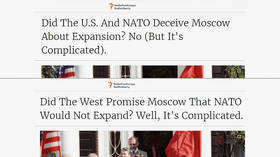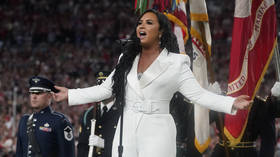US state-run RFERL backtracks on dubious claim West was honest with Russia about NATO expansion on its borders after online outcry

America’s foreign propaganda service has sparked ire online with its version of the history of relations between Russia and NATO. But, as all good historians know, the past can be subject to change, and it has since had a rewrite.
The article, by Mike Eckel, a senior correspondent for the state-run RFERL, drew criticism in Russia-watching circles after it was published on Wednesday. It set out to look at whether the US and its allies had given assurances to Moscow that the NATO military bloc would not expand eastwards, in an effort to avoid escalation and maintain stability in Europe.
Initially, the headline asked if Russia had been “deceived” by these promises, and thereby had a legitimate grievance when NATO signed up the former Soviet republics of Estonia, Latvia, and Lithuania as members. “No,” it boldly concluded, caveating, “(but it’s complicated).”
Quite how complicated the question really was would soon come back to bite RFERL, which quickly faced accusations it was glossing over a thorny issue to arrive at politically convenient conclusions.
Liviu Horovitz, a postdoctoral researcher at Brussels’ Institute for European Studies, described the article on Twitter as “excellent teaching material,” saying it served as a “prime example of how to report on a ‘debate’ so that nobody can ever guess that the ‘wrong’ side could potentially have some reasonable arguments.”
Excellent teaching material! Prime example on how to report on a "debate" so that nobody can ever guess that the "wrong" side could potentially have some reasonable arguments. https://t.co/PbiItNMB1S
— Liviu Horovitz (@liviuhorovitz) May 20, 2021
Ben Aris, a former Moscow bureau reporter for Britain’s Daily Telegraph and the editor of the BNE IntelliNews business network, added that it failed to mention the work of a prominent scholar whose work on NATO expansion would have fitted less harmoniously with its argument. This, he said, “is all the evidence you need that RFERL selectively chooses evidence to push its narratives.” Other users were more generous, with Keir Giles of Britain’s state-funded Chatham House describing it as a “valiant stab at boiling down” the question.
However, the American government-run media group evidently chose to listen to its critics, and an internet archive search shows the headline was quietly updated to leave the question open-ended instead. So, to “Did the West promise Moscow that NATO would not expand?” a newly nuanced Eckel subsequently concluded, “Well, it’s complicated.”
The historical row is important, because it has defined Russia’s view on relations with the US-led military bloc. In 2017, a tranche of documents was declassified, and widely interpreted as showing that American, British, and German officials gave assurances to the Kremlin in the 1990s that NATO would not push into Eastern European nations. The result was a number of years of relative harmony, with both sides even signing a declaration maintaining they did “not consider each other as adversaries.” However, in 2004, the bloc went through the single largest expansion in its history, admitting the Baltic nations, as well as Romania, Slovakia, and Slovenia.
Also on rt.com American ‘regime change’ specialists NED claim credit for Belarus protests & boast of funding Russian opposition during prank callFor many in Moscow, this was the beginning of the end for friendly ties with the West, with American troops stationed a stone’s throw from its border. It also led to a significant decline in trust, and was even cited by Russian President Vladimir Putin as a strategic threat in 2014, when the country announced it would reabsorb the Crimean Peninsula. Post-Maidan Ukraine has also since made no secret of its ambitions to join NATO, which has long been seen as a red line for Moscow, although it has received only a lukewarm response. However, some, like Eckel, continue to insist that the Kremlin was wrong to have interpreted these promises in this way, and that they were never binding.
George Kenney, a former US Foreign Service officer, sought to draw a line under that spat, commenting on the article. He said the position advanced by Washington at the time had been “a commitment, but not as iron-clad as a treaty.” However, he said, there was “no question in my mind that the US violated its promise.”
If you like this story, share it with a friend!














